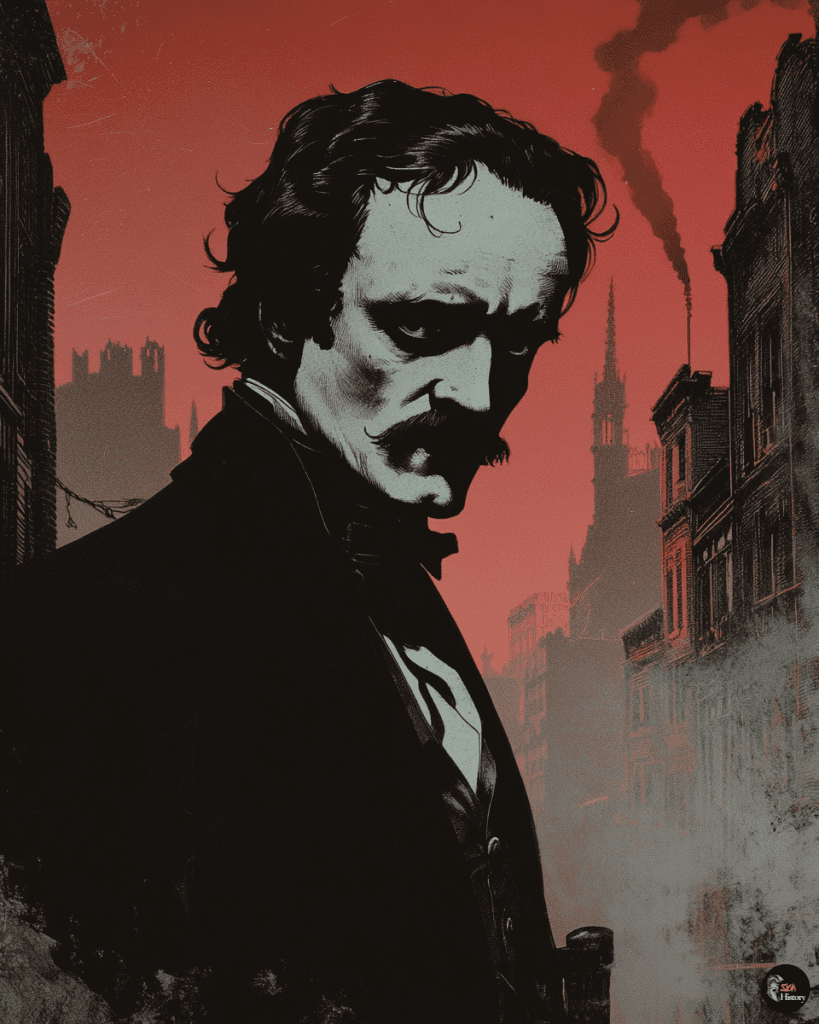Edgar Allan Poe, the renowned American writer and poet, met a tragic and enigmatic end in Baltimore on October 7, 1849. The circumstances surrounding Poe’s death remain shrouded in mystery, with no definitive cause ever determined.
Four days earlier, Poe was discovered near a tavern in East Baltimore, appearing disheveled and distressed. He was taken to Washington Medical College, where he spent his final days in a state of delirium. Witnesses reported that Poe repeatedly called out for someone named “Reynolds” and seemed to need immediate assistance.
Various theories have been proposed to explain Poe’s demise, ranging from alcoholism to rabies. Some speculate that he fell victim to a practice called “cooping,” where individuals were forcibly intoxicated and made to vote multiple times in elections. The truth behind Poe’s untimely death continues to captivate researchers and fans alike, adding another layer of intrigue to the legacy of this influential literary figure.
Life and Legacy of Edgar Allan Poe
Edgar Allan Poe’s impact on literature and his tumultuous final years continue to captivate readers and scholars. His pioneering works and the preservation of his legacy through institutions like the Poe Museum have secured his place in literary history.
Literary Contributions and the Poe Museum
Poe is widely regarded as a central figure of Romanticism and Gothic fiction in American literature. He revolutionized the short story format and is credited with inventing the detective fiction genre. His most famous works include the poem “The Raven” and stories like “The Fall of the House of Usher” and “The Cask of Amontillado.”
The Poe Museum in Richmond, Virginia, preserves his legacy. It houses the world’s finest collection of Poe’s manuscripts, letters, and personal belongings. The museum offers visitors a glimpse into Poe’s life and work, fostering a deeper appreciation for his contributions to literature.
Poe’s Later Years and Circumstances of Decline
In his final years, Poe faced numerous challenges. He struggled with alcoholism and financial difficulties. His health deteriorated, and he experienced bouts of depression following the death of his wife, Virginia, in 1847.
The exact cause of Poe’s death remains a mystery, with theories ranging from alcohol poisoning to rabies. This enigmatic end has only added to the intrigue surrounding his life and work.
The Mysterious Circumstances Surrounding Poe’s Death
Edgar Allan Poe’s final days remain shrouded in mystery. The renowned author’s demise in 1849 has puzzled historians and fans alike, with numerous theories attempting to explain the bizarre events leading to his death.
Timeline of Edgar Allan Poe’s Final Days
On September 27, 1849, Poe left Richmond, Virginia, bound for Philadelphia. He never reached his destination. Instead, he was found in Baltimore on October 3, in a state of great distress.
Poe was discovered at Gunner’s Hall, a tavern and polling place.
Joseph W. Walker, who found Poe, wrote to the author’s acquaintance, Dr. Joseph E. Snodgrass, requesting help. Poe was taken to Washington Medical College.
During his four days in the hospital, Poe drifted in and out of consciousness. He died on October 7, 1849, at the age of 40.
Theories and Investigations into the Cause of Death
Numerous theories have emerged to explain Poe’s death. Some of the most prominent include:
- Alcoholism
- Rabies
- Brain tumor
- Cholera
- Cooping (a form of voter fraud involving kidnapping and forced drinking)
The cooping theory suggests Poe was a victim of electoral fraud. Gunner’s Hall, where he was found, was a polling place on Election Day.
Some researchers propose that Poe’s symptoms align with rabies. Others argue for carbon monoxide poisoning or a brain tumor.
No definitive cause has been established, leaving Poe’s death an enduring mystery.
Poe’s Last Known Whereabouts and Condition
Poe’s last confirmed location before his discovery in Baltimore was Richmond, Virginia. He had been preparing for a trip to Philadelphia to edit a collection of poems.
Witnesses reported seeing Poe in good spirits before his departure. However, his condition deteriorated rapidly between leaving Richmond and arriving in Baltimore.
Poe was described as “worse for wear” and unable to explain his situation when found. His clothing was shabby and ill-fitting, unlike his usual attire.
In the hospital, Poe repeatedly called out the name “Reynolds,” but the significance of this remains unknown. He never regained enough lucidity to explain what had happened to him.

